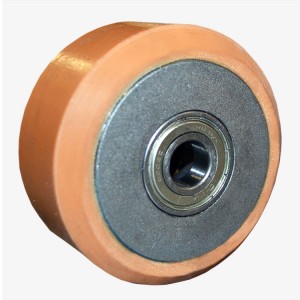Processing and Urethane Quality Can Make Or Break A Polyurethane Wheel

The advent of polyurethane roughly 50 years ago revolutionized many industries and products, including heavy-duty industrial casters and wheels.
Consider that today, roughly 80 percent of all heavy-duty caster and wheel applications require polyurethane tires attached to the wheel core. When processed and manufactured correctly, with suitably high-quality urethane, polyurethane wheels are excellent, long-lived products.
Unfortunately, improper processing, or using urethanes meant for non-dynamic applications, causes polyurethane tires to fail prematurely. At Caster Concepts, our engineers bring years of expertise to helping you determine the proper material for your polyurethane tire. I’d like to share five critical factors that increase your chances of procuring the highest quality polyurethane-tired wheel for your application.
1. Heat exposure – While polyurethane is extremely tough when used properly, excessive heat will melt the majority of polyurethane tires. Most common urethanes can’t withstand ambient heat above 230 degrees for more than 60-90 minutes without damage. Internally generated heat (by cyclic deflection of the urethane), in the 250° F range will liquefy the material within 15 minutes.
2. Physical properties – Polyurethanes used for industrial applications require higher physical properties. To ensure the proper urethane is used for your application, first consider: tear strength; tensile strength; modulus; and abrasion resistance.
3. Hot-cast urethane – Industrial wheels should always be produced using hot-cast urethane. Urethanes that are hot-cast, or poured at heat levels of 160-170° F and cured in the 190-240° F degree range, produce superior properties. These properties are necessary for your polyurethane wheel to carry out demanding dynamic applications in the industrial setting. Urethanes processed and cured at room temperature seldom possess the superior physical properties necessary for industrial wheel applications.
4. Quality manufacturing – Choose an ISO 9001-2008-certified manufacturer that follows a quality procedure. This will help alleviate hidden manufacturing defects caused by poor manufacturing procedure, which are the most common causes of failure in polyurethane wheels.
This failure typically occurs at the point where the urethane and the core (steel or cast iron), bond to support dynamic wheel applications. The manufacturer must properly prepare the core and cleanse the prepared surface, properly apply the bonding agent, and properly pre-heat the core. If any step isn’t performed correctly, defects can occur that increase the probability of failure at the bond and wheel.
5. Proper mix ratio – Modern meter mix machinery assures the proper ratio of isocyanates to the curing agent, which is critical to achieving peak performance. Stoichiometry is the measurement of the ratio of isocyanates to the curing agent. There are many modern machines equipped with advanced metering systems and mixers that ensure a consistent, standard stoichiometry mixture. Improper mixing creates material that might appear correct but won’t perform as designed.
Caster Concepts Inc. and Reaction Industries LLC., produces the highest quality urethanes with the most modern equipment available. Our mechanical and polymer engineers will help you meet the most demanding polyurethane wheel needs.
For information please contact us at customercentral@casterconcepts.com or call 517-629-8838.
